You have known for some time that your child struggles more than they should at home. They frequently forget daily routines, and you give constant reminders to help them focus. They quietly stare off while doing homework. Now a 5-minute task turns into 3 hours of back-and-forth. Your child cannot complete the work at school and is failing classes. After years of struggles, a psychologist evaluates your child. You learn that your child has Inattentive ADHD. In your mind, ADHD children are constantly moving, talking, and overly active. But if anything, your child seems under-active! And doesn’t the name ADHD stands for attention-deficit “hyperactivity” disorder?
The Inattentive vs. Hyperactive ADHD Debate
Many families can feel blindsided by their child’s Inattentive ADHD diagnosis. How can their child have ADHD when they have never been overly active? ADHD is a diagnosis that has changed frequently over the years. This has led to a great deal of confusion around the diagnosis.
Let’s go back to the beginning of the diagnosis so you see how the confusion started. ADHD first appeared as a diagnosis in the Diagnostic and Statistical Manual of Mental Disorders (DSM) in the 1960s and was termed the “hyperkinetic reaction of childhood.” A short attention span, hyperactivity, and restlessness characterized this diagnosis. In the 1980s, the third version of the DSM changed the diagnosis to “attention deficit disorder (ADD).” It was recognized at this time that attention and focus challenges did not always occur with over-activity. Thus, the diagnosis was changed to ADD with hyperactivity or without.
A few years later, the diagnosis changed to one type of ADHD with hyperactivity symptoms. By the 1990s, research clearly showed two types of children with attention challenges: those with hyperactivity and those without. The diagnosis was then termed ADHD, and three types emerged from the research: 1) those with inattentive characteristics, 2) those with hyperactive and impulsive symptoms, and 3) those with inattentive, hyperactive, and impulsive symptoms. Our current diagnosis of Inattentive ADHD in the DSM-V continues to show these three subtypes of ADHD exist.

What Does Inattentive ADHD Look Like in Children?
Children with inattentive ADHD behave distinctly differently than children with hyperactive/impulsive ADHD. For instance, your child with inattentive ADHD may have significant challenges holding their attention to tasks at home (e.g., getting ready for school, brushing teeth, doing chores, doing homework); however, they might have very focused attention to tasks that they like (e.g., playing video games, watching television, playing Legos). It is tough to get your child’s attention when they are focused on fun tasks. For instance, they may not respond to their name when you call them.
You might also find your child constantly saying, “What did you say?” after you give instructions. And then, once your child listens and begins a task, they become distracted and don’t finish. For instance, you tell them to get ready to leave in five minutes, only to find them playing with toys in their room five minutes later. They aren’t being defiant, but following multiple steps is HARD.
Children with Inattentive ADHD also struggle significantly with executive functioning skills. For example, they might have difficulty organizing their desks, backpacks, and bedrooms. They might also lose items, forget to bring homework home, forget to turn in homework, and fail to finish assignments. As you can imagine, this can result in poor grades at school. Sometimes, it can be hard to tell if it is an attention problem or if your child is struggling to learn.
If You Think Your Child Has Inattentive ADHD…
If your child struggles to stay focused and finish tasks across home and school, it may be time to find a specialist to do an evaluation. When considering Inattentive ADHD, it is also important to determine if your child’s difficulty focusing in school or doing homework is due to an underlying learning disorder, such as dyslexia.
Make sure to grab a copy of our FREE ADHD Parenting Guide to learn strategies to support your child with Inattentive ADHD at home. We include our top 6 keys for raising a happy and independent child with ADHD.
And check out our online parenting course, Creating Calm, for step-by-step strategies to address challenging behaviors and ALL the executive functioning tools. This course offers easy-to-implement strategies so you can find more joy in parenting your child with ADHD.
Have a beautiful week!
Lori, Katie, and Mallory







+ show Comments
- Hide Comments
add a comment